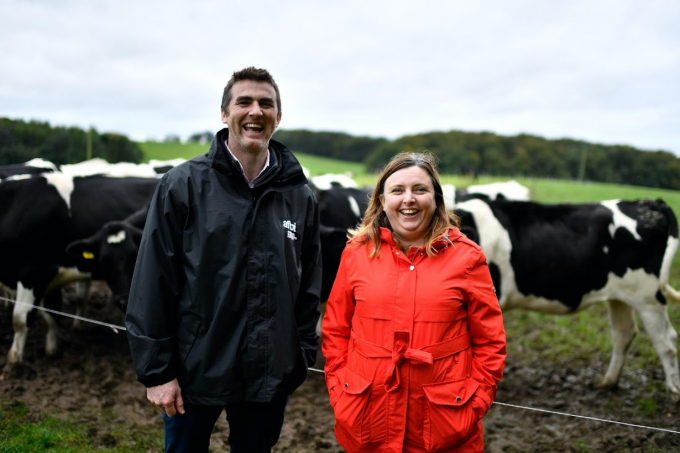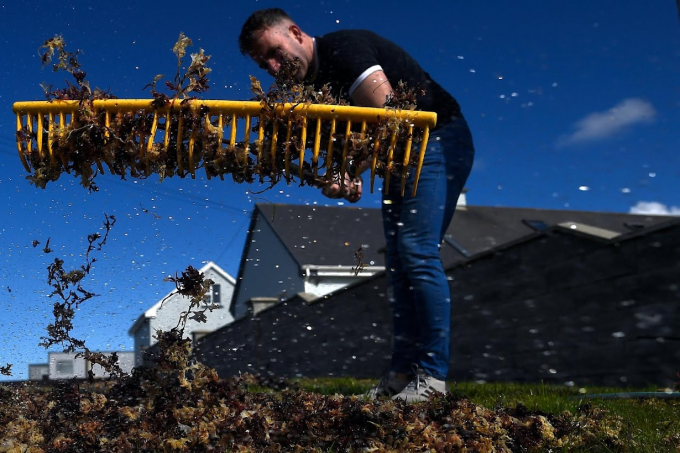November 28, 2025 | 01:27 GMT +7
November 28, 2025 | 01:27 GMT +7
Hotline: 0913.378.918
November 28, 2025 | 01:27 GMT +7
Hotline: 0913.378.918

Dr Steven Morrison, Programme Leader in Sustainable Livestock Production at AFBI (Agri-Food and Biosciences Institute) in Northern Ireland, and Sharon Huws pose for a photograph in front of dairy cattle at the AFBI (Agri-Food and Biosciences Institute) research farm. Photo: RT
The project, coordinated by a state agriculture body, is tapping into the country's growing seaweed harvesting industry, which is seeking new markets as it revives centuries-old traditions.
But some are sceptical that the seaweed feed additives - or any quick technological fix - can sidestep the need to reverse a surge in Irish cattle numbers if the country is to reduce Europe's largest per capita methane output by 2030.
Around 20 species of seaweed, most from Ireland's windswept Atlantic coast, have been tested by researchers while dozens more have been collected by the project's partners in Norway, Canada, Sweden, Germany and the United Kingdom.
Scientists in the United States and Australia have already demonstrated dramatic methane-reducing qualities from one seaweed type - Asparagopsis - when small quantities are added to feedstock.
But they have struggled to scale up production of the seaweed and to curb harmful side effects.
The Irish project aims to find abundant native seaweeds to use instead, even though the researchers admit they are unlikely to match the reduction in emissions of over 80% shown with Asparagopsis.
"We have identified some brown seaweeds that are very positive and they're producing results," said Maria Hayes, coordinator of the SeaSolutions project, whose team has achieved methane reductions of between 11% and 20% in early trials.
"The reductions aren't going to be a silver bullet ... but it can significantly reduce emissions," said Hayes, who works for Teagasc, Ireland's Agriculture and Food Development Authority.
Researchers are also working on how to integrate the feed additives into Ireland's predominantly grass-based cattle farming system.
On a farm outside Hillsborough, southwest of Belfast, researchers use treats to coax cows to poke their heads into a solar-powered machine that measures the level of methane on their breath.
They will test them again using seaweed additives, said Sharon Huws, Professor of Animal Science and Microbiology at Queen's University Belfast.
"The levels that are used to feed ruminants are very, very small so you don't need to get a lot of it in order to get an impact," she said.
POLITICAL PRESSURE

"Sustainably harvesting means that we get crop regeneration. Seaweed has been harvested in this area for hundreds of years, once sustainably harvested in the same way as our ancestors have done, it will continue to regenerate," said Evan Talty. Photo: RT
The technology has caught the imagination of farming groups and politicians, who insist that stringent targets for cutting greenhouse gases like methane should not mean a reduction in the size of the Irish farming sector.
After growth of over 10% in the past 10 years, Ireland has 7.4 million cattle and is one of the largest exporters of beef and dairy in Europe.
Its per capita output of methane - which has a higher heat-trapping potential than CO2 - is by far the highest in the European Union, according to the Climate Watch database.
The colourless and odourless gas leaks from waste dumps, oil and gas infrastructure and the digestive systems of cattle and sheep.
At the COP26 U.N. Climate Change conference in Glasgow this month, Ireland signed up to a pledge to cut global output of methane by 30% by 2030 from 2020 levels.
But government ministers insist that will mostly be achieved through a 50% cut in non-agricultural methane, with a reduction of just 10% in agricultural methane by 2030.
They point to seaweed feed additives as a way to curb emissions without downsizing the herd - with a reduction in the average age of slaughter of beef cattle and genetics research as other possible solutions.
Chemicals company Royal DSM says a rival food additive it produces can cut methane output by around 30%. The company said it had received regulatory approval in Brazil and Chile and is seeking approval in the European Union.
But not everyone is convinced the technology can meet the target.
"Scaling up these solutions takes time. We don't have time," said Sadhbh O'Neill, lecturer in climate policy and environmental politics at Dublin City University, a vocal critic of industry attempts to rely on technology rather than address the sustainability Ireland's agriculture model.
SCALING UP
The Irish researchers have tapped into a network of seaweed harvesters who are reviving a tradition mentioned in monastic writings as far back as the 5th century.
But they do not yet have a plan to scale up production if tests are successful.
Some harvesters, who serve organic food and cosmetic markets, doubt the feed additives will be sufficiently lucrative with plenty of opportunities elsewhere.
"It's a huge market at the moment, seaweed is really thriving," said Evan Talty, managing director at Wild Irish Seaweed, who has revived harvesting techniques used by his grandfather and focuses on food and skin care products. The methane additive market is "not on our radar", he said.
Others are more hopeful.
"Everyone keeps an eye on it," said Jenny O'Halloran of Bláth na Mara, a small-scale hand harvester on Inis Mór island off Ireland's west coast.
"Maybe the future of that is actually farming seaweed, which I think has to be part of the conversation when it comes to the future of seaweed in Ireland," she said.
(Reuters)

(VAN) A new study reveals how the simultaneous effects of ocean acidification, salinity and loss of oxygen are making the world more fragile.

(VAN) Hopes are growing that the creation of the first 3D turkey gut model could be a turning point in the battle against the virulent blackhead disease.

(VAN) Tyson, America’s biggest meat supplier, plans to shutter one of its largest beef processing plants as the industry continues to struggle with low cattle supplies and political pressure from Washington.

(VAN) New FAO study shows how digital solutions are empowering farmers and fishers to prevent losses and build resilient agrifood systems.

(VAN) Brazil's COP30 presidency pushed through a compromise climate deal on Saturday that would boost finance for poor nations coping with global warming but that omitted any mention of the fossil fuels driving it.

(VAN) Poultry farmers in the UK have been warned that they could face one of the worst winters yet for bird flu.

(VAN) Prices of main-crop paddy have risen sharply, with jasmine rice hitting 16,100 baht per tonne — the highest level in years.